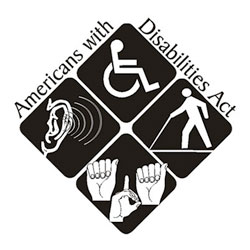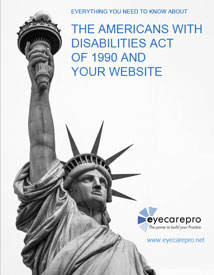 NEW YORK—Optometrists are among the health care professionals who need to be attuned to the latest requirements and proposed adjustments for the ADA Web Content Accessibility Guidelines.
NEW YORK—Optometrists are among the health care professionals who need to be attuned to the latest requirements and proposed adjustments for the ADA Web Content Accessibility Guidelines.
As EyecarePro points out, some law firms have taken to alarming people who have not yet updated their sites with “warning letters” even though the proposed rules are not yet adapted and the language is unclear.
According to EyeCarePro, “We are aware of the many changes that are taking place with website compliance issues at this time. Our company is working diligently to ensure that all the underlying technical structure of our clients' websites are in full compliance with the ADA Web Content Accessibility Guidelines (WCAG) Section 2.0 Level AA. These are the regulations that our counsel has advised us that will most likely be adopted by the U.S. Congress in 2018. However, this does not relieve practices of their responsibility to review their sites and manually address non-compliant content.”
To help ECPs understand the landscape of the Americans with Disabilities Act of 1990 and what that means to marketing online, EyeCarePro has just released a new, free e-book on the topic.
The Americans with Disabilities Act of 1990 (“ADA”) is a civil rights law that prohibits discrimination against individuals with disabilities in all areas of public life, including jobs, schools, transportation and all public and private places that are open to the general public. Traditionally, this law has been associated primarily with “brick and mortar” locations such as buildings, parking lots and other structures. The ADA, however, now extends beyond physical locations and into cyberspace.
 EyeCarePro’s Daniel Rostenne pointed out, “At its essence, the ADA is a civil rights law that prohibits discrimination against individuals with disabilities in all areas of public life, including jobs, schools, transportatio, and all public and private places that are open to the general public. Since your optometry practice represents a ‘private place open to the general public,’ this law applies to your cyber presence as well.
EyeCarePro’s Daniel Rostenne pointed out, “At its essence, the ADA is a civil rights law that prohibits discrimination against individuals with disabilities in all areas of public life, including jobs, schools, transportatio, and all public and private places that are open to the general public. Since your optometry practice represents a ‘private place open to the general public,’ this law applies to your cyber presence as well.
Rostenne said,“In essence, this is a good thing. Considering a good portion of your audience has some degree of vision disability, this law is protecting those same patients you serve.” He noted that most ODs want their website to be accessible to those with vision problems.
Rosten added, “While the law itself does not lay out specific rules for your online presence, compliance is based on a score of at least AA (based on a scale of A, AA or AAA) on each of the Web Content Accessibility Guidelines (or WCAG 2.0) criteria, created in part by the World Wide Web Consortium.”
EyeCarePro plans a series of communications about the current law and the proposed adjustments. The EyeCarePro ADA e-book can be downloaded here.
EyeCarePro provides comprehensive new patient marketing services to the optometric industry including SEO, PPC, content marketing, website design, social media marketing and integrated marketing campaigns.